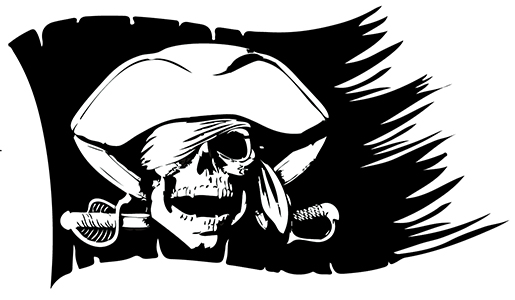September 19 is Talk Like a Pirate day. In this column, I observe the day by providing ways to mimic pirates (and law-abiding sailors) going beyond "Arrgh, matey."

By Captain Ray
Published: September, 2015
September 19 is Talk Like a Pirate day. In this column, I observe the day by providing ways to mimic pirates (and law-abiding sailors) going beyond “Arrgh, matey.”
During the 18th and 19th centuries, pirates and buccaneers of all sorts roamed the seas. These lawless bands of criminals raided other ships as well as settlements ashore. They smuggled, ran guns, blockaded ports and caused all manner of mischief. The Dutch word for these miscreants is “vrijbuter.” With its meaning morphing into any form of disruption by unusual means, it lives on in English (particularly in the political arena) as “filibuster.”
No sailing vessel can sail directly into the wind, but has to approach it at some angle. When a vessel was sailing as close as possible to the wind, she is said to be sailed “by and large.” This term has washed ashore to mean not tackling a matter directly or fully, but rather at some angle.
Some expressions betray their nautical origins immediately and without further explanation, such as that most ubiquitous of all toasts—“down the hatch.”
From Old French “baston,” meaning a strip of wood, English got the word batten, which aboard ship are thin pieces of wood used to hold tarpaulins (or canvas covers) over openings in the deck to help keep out the water. So now even people ashore prepare for adversity by “battening down the hatches.”
It is very clear who is comfortable working at sea. The constant motion of the vessel makes even the simple act of moving from one place to another fraught with difficulty for neophytes. When such newcomers have adjusted to their fluid environment—and by extension, when anyone becomes comfortable in a new situation—they are said to have found their “sea legs.”
The ancient Greek verb “to steer” was “kybernan.” This moved into Latin as “gubernare,” and ultimately into English (since the 14th century) as “to govern.”
Before the days of cannons it was common the build a battering ram into the bows of warships. With pomp and circumstance very important to them, the Romans began removing these “rostra” (Latin for beaks), shipping them back to Rome and displaying them in the Forum. The place chosen for this display of Rome’s growing power and influence in the Mediterranean world was directly in front of the speaker’s platform, which came to be known as the “rostrum.”
Here is yet another evolution of rostra into English. As sailing ships evolved through time, any projection or platform at the bow became known as the beakshead, later beakhead and finally just the head. In time, the entire forward portion of the vessel was referred to as the ship’s head. The gratings and nettings rigged there to save sailors from falling into the sea proved an ideal location to relieve oneself when nature called. The sanitary arrangements have improved significantly over the centuries, yet sailors still speak of “going to the head.”
From Old High German’s “helmo,” as well as “helma” in Old English and “helme” in Middle English, we get the name for the steering apparatus of a boat, whether it be a wheel or a tiller. This term jumped ship and came ashore as “at the helm,” meaning to be in a place of leadership.
English sailors of the 17th and 18th centuries were known to refer to a new recruit as “Johnny Raw” or “Johnny Newcome.” With its meaning now including anyone new to a job, this expression crossed the pond to America as “Johnny-come-lately.”
Ray Wichmann, is a US SAILING-certified Ocean Passagemaking Instructor, a US SAILING Master Instructor Trainer, and a member of US SAILING’s National Faculty. He holds a 100-Ton Master’s License, was a charter skipper in Hawai’i for 15 years, and has sailed on both coasts of the United States, in Mexico, the Caribbean and Greece. He is presently employed as the Master Instructor at OCSC Sailing in the Berkeley Marina.

